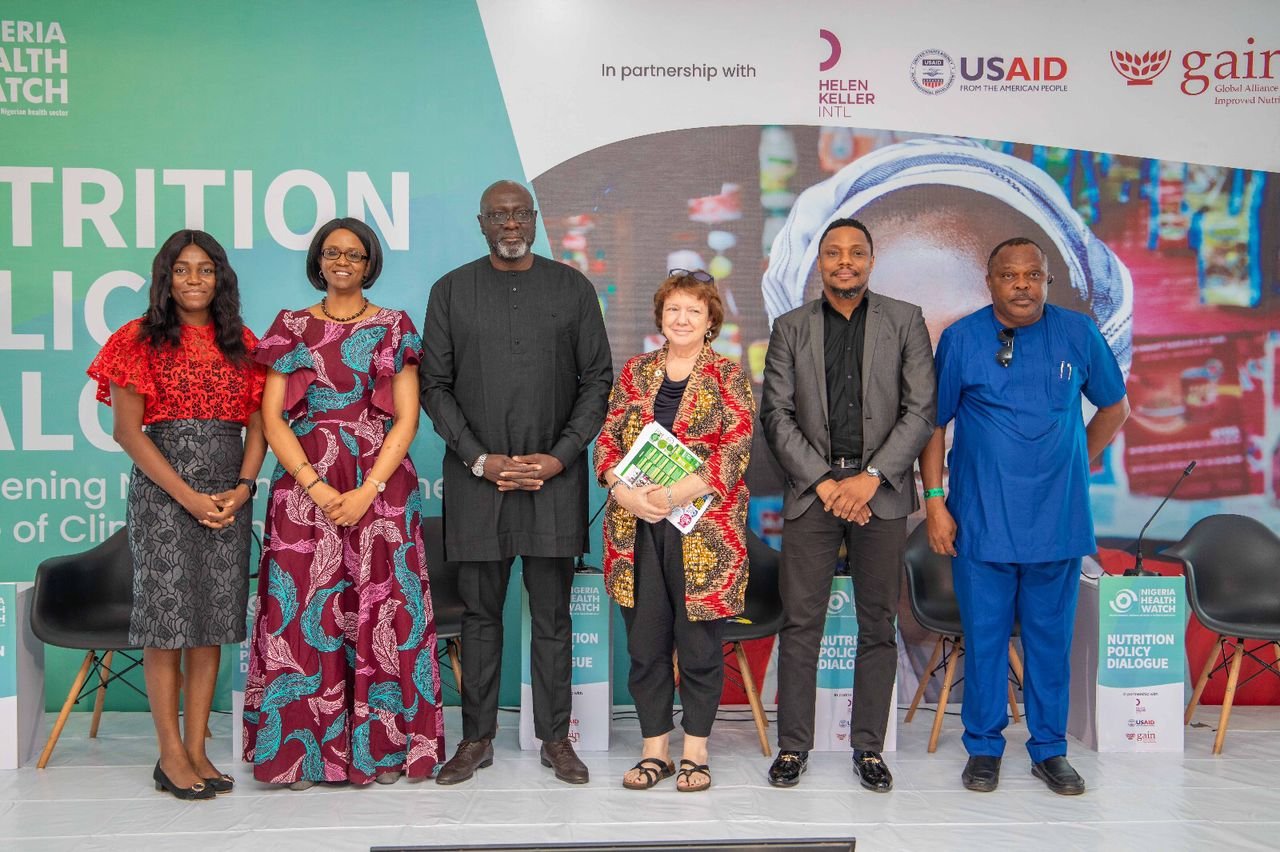By Abujah Racheal
Stakeholders in the health sector have called for a comprehensive approach to strengthen nutrition outcomes in the face of climate change in the country.
They made the call on Thursday in Abuja, at the 2023 Nutrition Policy Dialogue, with the theme: “Strengthening Nutrition Outcomes in the Face of Climate Change”.
The News Agency of Nigeria (NAN) reports that the dialogue was organised by Nigeria Health Watch, in collaboration with Global Alliance For Improved Nutrition (GAIN), Action Against Hunger Nigeria (ACF), Save the Children International and Helen Killer International (HKI).
Mr Uruakpa John, Director, Head, Prevention & Control of Micronutrient Deficiency, Federal Ministry of Health (FMOH), said that climate change has significant impacts on food systems, which can in turn affect nutrition outcomes.
John said that climate-smart agriculture involves practices that increase agricultural productivity, enhance resilience to climate change, and reduce greenhouse gas emissions.
“This can help to ensure that food systems remain productive and can provide nutritious foods even in the face of climate change,” he said.
He said that the 2023 dialogue was critical to raising awareness about climate change because the continent already has high levels of drought and malnutrition, noting that it would worsen if climate actions were not taken immediately.
He said that there is a need to promote national commitments that encourage healthy nutrition by developing national adaptation plans that include nutrition goals that target women and children; as well as raising awareness of climate change among policymakers and critical stakeholders in the country is imperative.
“Nigeria needs to build the capacity of health personnel and support a more robust institutional framework to enhance nutrition in the country,” he said.
He said that climate-smart agriculture, sustainable and resilient food systems, information, adequate funding and education were needed to ensure sustainable diets that were adequately diverse, nutritious and better aligned with contextual ecosystem functions and environmental conservation.
During a panel session, Dr Michael Ojo, Country Director, GAIN, said that the link between nutrition and climate change cannot be overemphasised.
“You don’t have to be an expert to see the link between nutrition and climate change; as connecting existing nutrition structure to climate change is critical to addressing the issue. For example, how do we use public procurement to drive nutrition issues,” he questioned.
Ojo said diversifying food systems can help to ensure that Nigerians get access to a variety of nutritious foods.
He said this should include promoting the production and consumption of indigenous crops and traditional foods, which could be more resilient to climate change.
Dr Jane Bevan, Chief, WASH Section, UNICEF, said climate change can affect water availability and quality, which can, in turn, affect nutrition outcomes.
Bevan said that improving water and sanitation infrastructure can help to ensure that Nigerians have access to clean water, which is essential for good nutrition.
She said that nutrition education can also help to ensure that Nigerians have the knowledge and skills to make healthy food choices, even in the face of climate change.
She said that wherever there was a high level of stunting in the country, there was a WASH issue.
“About 99 per cent of Nigerians know about handwashing but need to practice it regularly; promoting sanitation will improve lives,” she said.
According to her, Nigeria is one of the highest-risk countries in the world for children’s growth due to Malnutrition and other factors.
She said that there was a need to develop a landscape indicator to aid the implementation of initiatives to curb these issues.
Mr Chukwuma Anene, Senior Programme Officer, USAID Advancing Nutrition, said that USAID prioritised approaches to addressing climate change while implementing Nutrition Programmes.
Anene said that climate change affects the production of food, so USAID aims at building resilience for climate change.
He said that there was a need for a multi-sectoral approach towards enhancing food security and production in the face of climate change in the country.
Earlier, the Managing Director, Nigeria Health Watch, Mrs Vivianne Ihekweazu, said that the 2023 dialogue presented issues affecting Nigerians’ public health.
Ihekweazu said that is a critical issue that affects the health and well-being of the country.
She said that hunger and poor nutrition continue to raise global challenges, claiming countless lives and hindering progress towards Sustainable Development Goals.
“In Nigeria alone, undernourishment claims the lives of one out of 10 children before the age of five.
“In light of these realities, the Nutrition Policy Dialogue serves as a platform to facilitate constructive discussions and develop actionable recommendations.
“We aim to explore the impact of climate change on food security, nutrition and overall health,” she said.
She said the aim is for the country to forge a path toward more resilient and sustainable solutions by fostering collaboration and knowledge exchange.
“We must work together to shape the trajectory of our nation’s nutrition landscape through actionable recommendations,” she urged.
The Managing Director said that by taking a comprehensive approach to strengthening nutrition outcomes in the face of climate change, the government could help to ensure that Nigerians remain healthy and resilient, even in the face of a changing climate.
NAN reports that discussions on malnutrition started in 2017 when it began a campaign #FeedNaijaPikin, to draw attention to the issue of malnutrition among children under 5 in Nigeria.
During the campaign, the team visited many locations to understand the issues, including Community Management of Acute Malnutrition (CMAM) sites in Zamfara and Kaduna states.
“Its findings motivated us further to continue this important conversation, even after the initial project came to an end,” the team added. (NAN) (www.nannews.ng)
Edited by Vincent Obi











